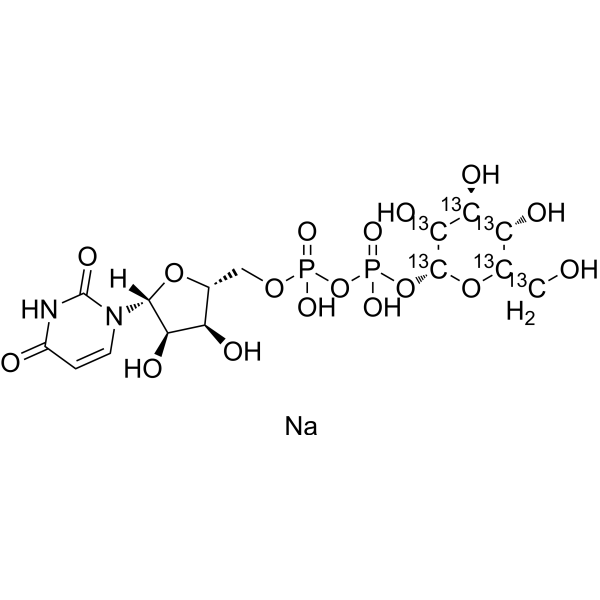Uridine 5′-diphosphoglucose-13C6 disodium
Modify Date: 2025-08-27 10:18:09

Uridine 5′-diphosphoglucose-13C6 disodium structure
|
Common Name | Uridine 5′-diphosphoglucose-13C6 disodium | ||
|---|---|---|---|---|
| CAS Number | 2483735-04-0 | Molecular Weight | 590.21 | |
| Density | N/A | Boiling Point | N/A | |
| Molecular Formula | C913C6H19N2NaO17P2 | Melting Point | N/A | |
| MSDS | N/A | Flash Point | N/A | |
Use of Uridine 5′-diphosphoglucose-13C6 disodiumUridine 5′-diphosphoglucose-13C6 (disodium) is the 13C labeled Uridine 5′-diphosphoglucose disodium salt[1]. Uridine 5′-diphosphoglucose disodium salt (UDP-D-Glucose disodium salt) is the precursor of glucose-containing oligosaccharides, polysaccharides, glycoproteins, and glycolipids in animal tissues and in some microorganisms. Uridine-5′-diphosphoglucose is an agonist of the P2Y14 receptor, a neuroimmune system GPCR[2]. |
| Name | Uridine 5′-diphosphoglucose-13C6 disodium |
|---|
| Description | Uridine 5′-diphosphoglucose-13C6 (disodium) is the 13C labeled Uridine 5′-diphosphoglucose disodium salt[1]. Uridine 5′-diphosphoglucose disodium salt (UDP-D-Glucose disodium salt) is the precursor of glucose-containing oligosaccharides, polysaccharides, glycoproteins, and glycolipids in animal tissues and in some microorganisms. Uridine-5′-diphosphoglucose is an agonist of the P2Y14 receptor, a neuroimmune system GPCR[2]. |
|---|---|
| Related Catalog | |
| In Vitro | Stable heavy isotopes of hydrogen, carbon, and other elements have been incorporated into drug molecules, largely as tracers for quantitation during the drug development process. Deuteration has gained attention because of its potential to affect the pharmacokinetic and metabolic profiles of drugs[1]. |
| References |
| Molecular Formula | C913C6H19N2NaO17P2 |
|---|---|
| Molecular Weight | 590.21 |
| InChIKey | ZIEBASYWDSMHND-CUDKOXKLSA-N |
| SMILES | O=c1ccn(C2OC(COP(=O)(O)OP(=O)(O)OC3OC(CO)C(O)C(O)C3O)C(O)C2O)c(=O)[nH]1.[Na].[Na] |